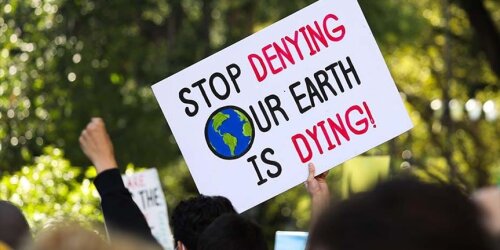Europe’s current heatwave is breaking records, detrimentally impacting people’s health, the economy, agricultural production, and tourism, and the trend is likely to become more frequent for decades, the chief of world’s weather group said Tuesday.
“The negative climate trend will continue, at least until the 2060s, independent of our success in climate mitigation efforts,” World Meteorological Organization (WMO) Secretary-General Petteri Taalas told journalists at a UN press conference in Geneva.
“And that means these weather conditions are becoming more common.”
During the press conference on the current European heatwave, he said that the world has better means to adapt to heatwaves than in the past as in many countries, people have improved the facilities for dealing with heatwaves and know more about the health risks related to such kinds of events.
Taalas said the awareness of climate change is much higher than it used to be.
He said that ways to alleviate it can be seen in the energy sector with climate-friendly solutions as well as in transport and people’s diets, while prices related to medicaments are lowering.
“But the same people who have been vulnerable to the COVID-19 pandemic are especially vulnerable to heatwaves,” said the WMO head.
“So, we expect to see increased deaths among the elderly and those people who are already sick. We are also expecting to see major impacts on agriculture.”
Harvests lost
In past European heatwaves, large parts of the harvests were lost.
“And under the current situation we are already having this global food crisis because of the war in Ukraine, so this heatwave is going to have further negative impacts on agricultural activities.”
He said such heatwaves would become more frequent during the coming decades.
Taalas also said the UK had already broken its all-time high temperature earlier on Tuesday, reaching 39.1 degrees Celsius (102.2 degrees Fahrenheit). He expected it to rise above 40C (104F) later in the day.
Using a sports analogy, the WMO chief said when sports people engage in doping, they perform with a higher intensity than usual.
“And we have been doping our atmosphere by injecting more greenhouse gases, especially carbon dioxide, into the atmosphere.”
News ID : 1004
 Russia declares temporary ceasefire to evacuate citizens
World
Russia declares temporary ceasefire to evacuate citizens
World
 How Big is Infinity?
World / Breaking News
How Big is Infinity?
World / Breaking News
 All you need to know about Easter
World / Opinion
All you need to know about Easter
World / Opinion
 The Arab League calls on Israel to suspend Jewish prayers at Al-Aqsa Mosque
World / Breaking News
The Arab League calls on Israel to suspend Jewish prayers at Al-Aqsa Mosque
World / Breaking News
 Global Temperatures Reach Record High, Climate Scientists Warn of Dire Consequences
World / Breaking News
Global Temperatures Reach Record High, Climate Scientists Warn of Dire Consequences
World / Breaking News
 Global climate strikes, environmental protests in 2021
World
Global climate strikes, environmental protests in 2021
World
 International community condemns the killing of iconic Palestinian journalist
Human Rights
International community condemns the killing of iconic Palestinian journalist
Human Rights
 Despite Biden's vows, Yemen starves
Human Rights
Despite Biden's vows, Yemen starves
Human Rights
 Who was Shireen Abu Akleh; How was she martyred
Human Rights / Opinion
Who was Shireen Abu Akleh; How was she martyred
Human Rights / Opinion
 Kiss of Ashgabat
World / Opinion
Kiss of Ashgabat
World / Opinion